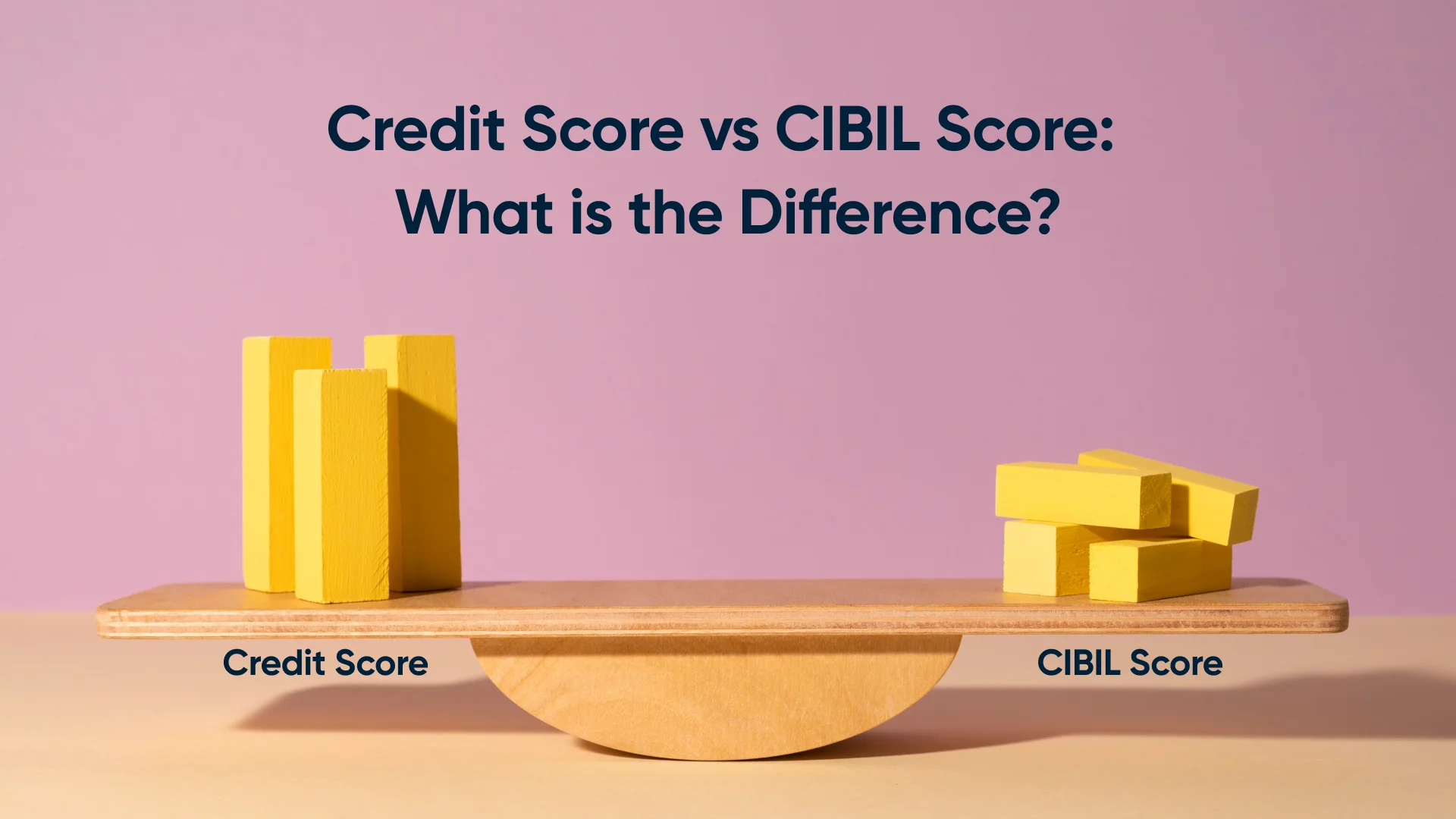The Complete Guide to Interpreting Your CIBIL Score Range

From getting approved for a small ticket loan of ₹1000 to a full-fledged home loan, your credit score plays a very crucial role in it.
Your credit score shows the lender how safe or risky you are as a borrower. Based on this information, they decide if you are eligible for their credit product or not and what is the maximum credit limit you should get. In this blog, we’ll learn everything you should know about the credit score.
Table of Contents
ToggleWhat is Credit Score?
A credit score is a score that determines the credit worthiness of a person. It is calculated based on your past repayment behaviour. Higher the credit score, the higher are the chances of getting approved for loans and other credit products.
Who Gives Credit Score?
There are four bureaus in India that provide credit score:
1. CIBIL:
The full form of CIBIL is Credit Information Bureau India Limited. It was founded in 2000 and is the first bureau licensed by the Reserve Bank of India (RBI).
CIBIL gathers and keeps credit data of individuals and enterprises. This information is used to create credit reports and credit scores which are used by lenders to decide the creditworthiness of borrowers.
2. Experian:
Experian was founded in 1996 and got its licence to operate in India in 2010. The Experian score also ranges from 300 to 900. It offers many services like data analytics, engagement and customer targeting.
3. Equifax :
Equifax is also a global credit bureau that is licensed by RBI. It collects credit details from banks, NBFCs, and other lenders. It also gives other services like fraud management and industry diagnostics.
4. High Mark
The full form of CRIF is the Centre for Research in International Finance High Mark. It is a joint venture between an Indian company High Mark Credit Information Services and a global credit information company CRIF. A CRIF score above 720 is considered a healthy score by lenders.
Read More: What is CRIF? Difference Between CIBIL & CRIF Score
What is CIBIL score?
The Credit Information Bureau India Limited (CIBIL) is a bureau authorized by the RBI that generates the credit score based on the credit report and repayment behaviour. That credit score is called a CIBIL score. They follow a score range of 300-900.
What is a Good (or Bad) Credit Score?
A good credit score is an indicator that you have a low credit risk and repay your loans on time, making you an ideal borrower.
A bad credit score indicates bad repayment behaviour like missed repayments, defaults or bankruptcy.
Given below is the breakup of good and bad Cibil score range:
Cibil Score Range | Rating |
< 650 | Poor |
650 – 699 | Average |
700 – 749 | Good |
750 – 799 | Very good |
> 799 | Excellent |
Anything above 700 is considered as good CIBIL score. This increases your chances of getting a higher credit amount, lower interest rates, and many other benefits.
Read More: Personal Loan Interest Rates & Charges
Benefits of Maintaining a Good CIBIL Score
Your CIBIL score is so much more than a three-digit number. It can help your loan application in the following ways:
1. Instant Loan Approvals
A good CIBIL score is one of the key indicators of a low-risk borrower who can be trusted with credit. When you show a history of responsible borrowing and timely repayments, you are more likely to get approved for loans faster. This is because a high credit score gives the loan provider confidence in your ability to repay the loan.
Read More: How to Get Perfect 900 Credit/CIBIL Score?
2. Quicker Disbursements
If you have a good CIBIL score, it can help speed up the process of disbursal after you are approved for a loan. This is because you would become a priority customer for the lender because of good repayment behaviour.
3. Higher Credit at Lower Interest Rates
High-ticket loans such as home loans, car loans and personal loans can have a high interest rate. But when you have a good CIBIL score, you give yourself an added advantage of being able to avail these high-ticket loans at lower interest rates. This will significantly help you borrow money at a lower cost.
Factors that Affect CIBIL Score
Your three-digit CIBIL score is calculated after keeping many factors in mind:
1. Repayment History
The way you wouldn’t want to lend money to that friend who never pays you back, a lender would never want to give credit to people who make late payments on their EMIs, credit card bills or default on their repayments.
Your repayment history is a significant contributor to your credit score.
Late payments, defaulting on loans, and paying only the minimum amount are signs of a bad repayment history which reflects negatively on the CIBIL score.
2. Credit Mix
Credit Mix means having a balanced amount of secure and unsecured loans such as credit cards, car loans and more. A good credit mix is important for maintaining a good credit score.
A diverse mix of loans indicates you can manage different types of credit which can help you improve your CIBIL score.
3. Multiple Enquiries
Whenever you apply for a loan, the credit provider assesses your credit profile which is known as a credit enquiry. Having too many enquiries in a short period of time can have a negative impact on your credit score. Hence, it is important to avoid applying credit cards and loans in a short period of time as this may have a negative impact on your profile.
4. Credit Utilization
Credit utilization is the total credit that you use out of the total amount of credit across all your cards. Having a high credit utilization can negatively affect your credit score. Hence the best practice to maintain a good CIBIL score is to ensure that your credit utilization is not more than 30% on individual cards.
What is CIBIL Report?
CIBIL report, also known as Credit Information Report or CIR, is the report of an individual’s credit repayment history of all credit cards and loans. You may read more about it here.
CIBIL report, also known as Credit Information Report or CIR, is the report of an individual’s credit repayment history of all credit cards and loans.
Your CIBIL report has details of all your credit accounts like loans, overdrafts and credit cards. A CIBIL report makes it easier for lenders to assess your creditworthiness since it shows how you’ve managed your debt in the past, and whether you made repayments on time.
Read More: How to download CIBIL report
Tips to Maintain a Good CIBIL Score
You can improve your CIBIL score by practicing these 5 simple steps:
1. The best practice for maintaining a good CIBIL score is to make your repayments on time. An easy way of going about this is by setting auto-debit for all your repayments.
2. Ensure your credit utilization doesn’t exceed 50 percent. The best practice is to make sure your utilization is around 25-30%.
3. Maintain a healthy credit mix and make sure you’re repaying all your loans on time.
4. Keep a check on the number of credit enquiries you make. Applying for too many loans and credit cards at once can increase the total number of inquiries which can negatively affect your score.
5. Make it a habit to review your CIBIL report at regular intervals. This will help you avoid any form of discrepancies and ensure that there are no errors in your report.
In Conclusion
Maintaining a good CIBIL score comes with advantages like instant loan approvals, faster disbursals, higher amounts, and low interest rates, and is also a sign of good financial health and good personal finance habits.
Frequently Asked Question
What Is A Cibil Score Range?
A CIBIL score ranges between 300 and 900. It reflects the creditworthiness of the borrower. Individuals with scores above 700 are considered responsible borrowers.
What Is The Minimum And Maximum Cibil Score In The Range?
The lowest CIBIL score is 300, and the highest is 900. You should always maintain a good credit score so you can enjoy better credit and financial opportunities.
Can Errors In The Credit Report Affect The Cibil Score Range?
Errors in your credit report can affect your CIBIL score. Common errors include incorrect personal information, duplicate accounts, incorrect loan balances, etc. You can contact the credit bureau to get these mistakes resolved.
Are There Different Cibil Score Ranges For Different Types Of Loans?
The CIBIL score ranges from 300 and 900. Loan companies have different criteria and CIBIL score requirements for different types of loans. It also varies from lender to lender.
How Does A Good Cibil Score Affect My Loan Or Credit Card Application?
Individuals with high CIBIL scores are perceived as less risky borrowers. As a result, it increases your chances of approval, gives you higher credit limits and makes it possible to get loans at low-interest rates.
YOU MAY ALSO LIKE





Search by posts
Recent post
Categories
- Blog (2)
- Credit History (25)
- Credit Line (7)
- Festive (3)
- Finance (15)
- Mutual Fund (9)
- Personal Loan (231)
- Tax (8)
- Zype (4)









